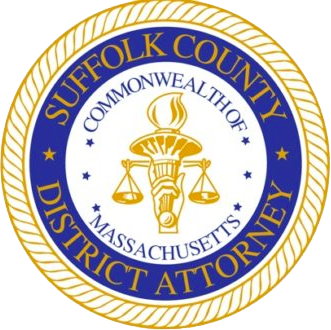DA Rachael Rollins Asks Single Justice of SJC to Stop BMC Judge’s Dangerous Behavior. Again.
Municipal Court COVID-19 Standing Order was violated. Again.
Arrest Warrant wrongly issued. Again.
BOSTON, November 21, 2020 — For the second time in a two week period, the Office of Suffolk County District Attorney Rachael Rollins yesterday filed an emergency petition with a single justice of the Supreme Judicial Court to make the same Boston Municipal Court judge follow his court’s own COVID-19 policies and Standing Order. DA Rollins’ staff, which is funded by taxpayers, had to file, again, a pleading to void a second warrant issued by that judge because a defendant was not physically or virtually present in his courtroom. The Commonwealth won a similar emergency petition on Nov. 10. And this instant behavior is in direct violation of that ruling against Judge Summerville.
“For both health and constitutional reasons, this is serious and intentionally defiant conduct that is very likely to cause harm,” said District Attorney Rollins. “It is outrageous and absurd that we are back here again. I feel like I am Phil Connors in Groundhog Day. But this shows how little oversight Judges in this state actually have.”
On Nov. 10, a single justice of the SJC ruled that Judge Mark Summerville’s October 2020 order that a defendant must attend a hearing in person should be vacated, and that an arrest warrant for that defendant, who lives in Delaware, be “recalled forthwith.”
Despite the freshness of that recent SJC ruling, the state court system (like everyone) grappling with a surging Global pandemic, the session in question being conducted virtually, and a standing order from the BMC in August, which said, in part, because of COVID-19 that “[a]ll matters, other than jury trials, that do not occur in-person pursuant to Section I.B. shall occur virtually” (emphasis added). Judge Summerville yesterday refused a nolle prosequi the Commonwealth was entering in the case, and issued a default warrant for defendant Raul Cuevas. Meaning, Mr. Cuevas could be arrested on sight because Judge Summerville ordered that a warrant be entered into the system. Mr. Cuevas was charged with unlicensed operation of a motor vehicle.
The most recent emergency petition notes “there is a sign on the door relaying that parties are prohibited from entering the courtroom,’’ and describes what transpired yesterday:
“When the case was called, the prosecutor moved to nolle pros the case and Judge Summerville refused and upbraided the prosecutor for not being physically present in the courtroom. He also told the prosecutor that emailing the filing (the way the clerk’s office is receiving filings for virtual sessions) was inappropriate. When the prosecutor asked for a second call to walk a physical copy of the nolle prosequi to the courtroom, Judge Summerville refused and instead issued a default warrant because Mr. Cuevas, who has no other criminal history, was not present either in person or virtually in the courtroom.”
When a nolle prosequi is being entered, a defendant is not required to be present in court. “Also of note,” said DA Rollins, “is that the Commonwealth does not need a Judge’s approval, acceptance or permission to enter a nolle prosequi. Nolle prosequi’s are entered by the Commonwealth, Judges are not even a consideration in the process.”
The SJC filing goes on to state that Judge Summerville, “in violation of the separation of powers, refused to recognize the Commonwealth’s ‘absolute power to enter a nolle prosequi’ and terminate prosecution of a criminal complaint…This too is problematic given that a little over a year ago this Court held that a judge of the Central Division of the Boston Municipal Court erred in refusing to recognize a nolle prosequi filed by the Commonwealth. The continued defiance of the constitution and minimization of the very real dangers of an insidious virus must end.”
The District Attorney’s absolute power to exercise a nolle prosequi came “only after a reasoned calculus to forego prosecution that carefully balanced resource allocation with public safety concerns with its ability to prove the crimes charged based upon the facts of each case,’’ the filing states. “Judge Summerville’s interference with the District Attorney’s constitutional authority cannot stand.”
The filing asks the state’s highest court to “exercise its powers pursuant to G.L. c. 211, § 3 and order that the nolle prosequi be entered in this case, that the default warrant be removed, and that the judges of the Boston Municipal Court be ordered to follow the Standing Order of the court.”
The judge referenced for conduct occurring over a year ago is Judge Richard Sinnott. District Attorney Rollins noted the Judicial Conduct Commission was supposed to look into Sinnott’s actions. “At best, his behavior is bizarre and aggressive; at worst it is unbecoming, unethical and unconstitutional. Remember, it was 14 months ago when he held Attorney Church in contempt and had her detained for several hours. Where are the findings of the JCC?
“ The JCC is Chaired by a sitting Judge and has several sitting Judges on the commission responsible for making decisions about other sitting Judges and operates in complete secrecy. Sound familiar? If we are going to demand accountability of Police Departments for their Internal Affairs and Anti-Corruption Departments, why aren’t we demanding the same transparency and oversight of our judges?”
Suffolk County District Attorney Rachael Rollins’ office serves the communities of Boston, Chelsea, Revere, and Winthrop, Mass. The office handles over 25,000 cases a year. More than 160 attorneys in the office practice in nine district and municipal courts, Suffolk Superior Court, the Massachusetts Appeals Court, the Supreme Judicial Court, and the Boston Juvenile Courts. The office employs some 300 people and offers a wide range of services and programs to serve anyone who comes in contact with the criminal justice system. This office is committed to educating the public about the services we provide, our commitment to crime prevention, and our dedication to keeping the residents of Suffolk County safe.


